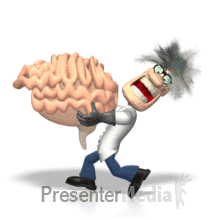PSYCHOSOCIAL:
- Social Skills Training
- Cognitive Therapy
- Day programs
- Stress reduction/relaxation training
- Vocational rehabilitation
 |
| from http://www.theclinic.org.uk/images/animated_gif.gif |
PHARMOCOLOGICAL:
Antipsychotic medication. These medications are constantly being improved. Current antipsychotic medications result in fewer side effects than those administered years ago. Medications aimed at restoring some of the cognitive deficits, such as attention and memory problems, are being developed.
Cognitive capability is often a better predictor of how well a person with psychosis will function than are residual symptoms of psychosis.
Medications are usually started in the acute phase and are thereafter taken continuously, even if symptoms have remitted. Frequently, individuals with schizophrenia must continue taking these medications for several years because when not taking medication, the risk of relapse is 60-80% per year. On medication, the risk goes down to less than 20%.
 |
| from http://www.naturalhealthtechniques.com/specificdiseases/medical_95.gif |
Cognitive capability is often a better predictor of how well a person with psychosis will function than are residual symptoms of psychosis.
EDUCATION:
- Understanding the illness. It is crucial for treatment centres to offer education to individuals with psychosis and their families about the condition, in order to ensure their understanding and to promote their active participation in treatment. This has been shown to improve outcome.
- Understanding the treatments: Education programs are generally conducted in the recovery phase and include information about the disorder itself, as well as information about medications, psychosocial treatments, the effects of street drug use, and early signs of relapse.
- Understanding the need for on-going care. These programs are also important in helping individuals with psychosis understand why it is important to continue taking medications, even after symptoms improve.
- Family education. It is important to educate family members about the disorder and what to expect so that they will be prepared to help their loved ones with psychosis. Families need help to cope themselves.
 |
| from http://i717.photobucket.com/albums/ww173/prestonjjrtr/Halloween/FrankAddamsFamily.gif |
 |
| from http://www.presentermedia.com/files/animsp/00000000/533/mad_scientist_running_with_brain_md_wm.gif |
 |
| from http://www.wellingtonhealthcentre.co.uk/website/E87754/files/nurse_animated.gif |
- Decreasing positive and negative symptoms
- Maintaining or increasing cognitive abilities
- Minimizing side-effects
- Reducing secondary morbidity
- Preventing relapse
- Enhancing quality of life
 |
| from http://machinatorium.files.wordpress.com/2009/10/whitehead.gif |
MEDICATIONS
Antipsychotics or neuroleptics were discovered in the late 1950's by the Company Rhone Poulenc in Paris. This first antipsychotic drug was called Chlorpromazine which was used as a 'tranquilizer'. Its more specific benefits were recognized by accident. It was found to decrease positive symptoms such as hallucinations, delusions, and thought disorder.
 |
| from http://i30.tinypic.com/24ydds6.jpg |
Antipsychotics are helpful in the acute stage of illness as they reduce symptoms. They also work to prevent symptoms from recurring and to prevent relapse. Studies show that those who take their medications as prescribed over one year have less than a 20% chance of having a relapse and returning to hospital. Those who do not take their medications have a 60- 80% chance of having a relapse and returning to hospital.
 |
| from http://upload.wikimedia.org/wikipedia/commons/8/8f/Internal_capsule.gif |
ATYPICAL ANTIPSYCHOTICS
These medications produce less side effects and may be slightly more helpful for the negative symptoms than the classical antipsychotic medications.
1. Risperidone:
 |
| from http://aquabotic.com/2009/01/animated%20pill%20gif.gif |
2. Olanzapine:
This is an effective medication .
3. Quetiapine:
This effective medication needs to be taken twice a day.
4. Clozapine:
This may be the most effective of all the atypical antipsychotics. Unfortunately, not everyone can take this medication. Five % get a temporary decrease in their white blood cell count, which could lead to serious infections.
They must discontinue the drug immediately. In order to prevent any problems, users must have weekly blood testing (every two weeks after 6 months) and discontinue the drug immediately should there be a drop in the white cell count. Other side effects include weight gain, sedation, constipation and increased saliva. This medicine has been proven to be more effective for some of the 20% or so of people who do not respond to other medicine.
 | |
|
They must discontinue the drug immediately. In order to prevent any problems, users must have weekly blood testing (every two weeks after 6 months) and discontinue the drug immediately should there be a drop in the white cell count. Other side effects include weight gain, sedation, constipation and increased saliva. This medicine has been proven to be more effective for some of the 20% or so of people who do not respond to other medicine.
 |
| CONSTIPATED from http://fc06.deviantart.net/fs71/f/2010/025/1/6/Sabato_Constipated___Animated_by_ladyfreya01.gif |
Side Effects: One goal of treatment should be freedom from side effects. Many patients are able to achieve this with their doctors help. Side effects that may occur for some people include:
 |
| from http://www.gifbin.com/bin/062009/1245228284_parkinsons.gif |
- Tremor
- Slowed down movements
- Muscle stiffness and rigidity
2. Anticholinergic side effects:
- Dry mouth (use sugarless gum, ice chips, lots of water)
- Blurry vision (usually improves over time)
- Constipation (add fibre like fruits and vegetables and drink lots of water 6-8 glasses a day)
- Sedation (take the medication at night), improve sleep schedule, increase physical and mental activity during the day
 |
| from http://fc07.deviantart.net/fs71/f/2010/017/e/2/BLAH_by_Zombiebashr.gif |
- Restlessness
 |
| from http://www.orkut-scrap.net/img/Smiley-Moods/restless.gif |
4. Acute Dystonic reaction:
- Sudden muscle cramps
5. Tardive Dyskinesia:
- Tic like involuntary movement of muscles.
 |
| from http://foolchild.com/images/gifs/twitch4.gif |
ANTIDEPRESSANT MEDICATION
 |
| from http://tristanwright.files.wordpress.com/2010/09/self-portrait-gif.gif |
Antidepressant medication starts to work only after 1 to 4 weeks so some patience is required when getting started. Like antipsychotic medication, antidepressants are not addictive; however, care should be taken when stopping the medication. A physician can help you to slowly reduce and then stop the antidepressants when you agree it is time to do so to minimize side effects.
Some people experience one or more of:
- Blurred vision in some people
- Constipation in some people
- Sedation in some people
- Insomnia in some people
- Nightmares in some people
- Weight gain in some people
 |
| from http://img149.imageshack.us/img149/194/11502239908115mh.gif |
Many Antidepressants are long lasting and therefore some may be taken only need to be taken once a day.
MOOD STABILIZERS
Lithium: Lithium is an element that occurs naturally. It is a salt. It is present in Great Salt Lake and the Dead Sea. It's use as a mood stabilizer was discovered in the 1950 Os. Lithium works by balancing serotonin. It seems to help bi-polar (manic-depression) disorder in 75% of people. It is also sometimes used to boost the effect of antidepressants or antipsychotics in non-bipolar patients. Lithium can be detected in the blood by testing. Generally, when one begins to take lithium, blood tests are used to determine the correct dose. Lithium is usually taken once or twice daily.
Side Effects: Lithium is usually well tolerated but, in some, can cause:
- Dry mouth
- Diarrhea
- Tremor
- Voiding too often
- Thyroid problems: a minority of people in the long term can require thyroid hormone replacement to be taken daily.
 |
| from http://bluesairmen.com/Quickstart/ImageLib/animated-toilet-paper-washroom-humor-photos.gif |
Benzodiazepines: (e.g. ativan, valium) These have been in use since the 1960's and are very effective for anxiety or insomnia. They were originally marketed as non-addictive but after some years on the market it was concluded that they do cause dependency in a minority of people. Their effectiveness also tends to wear off after a time. Benzodiazepines are generally useful in the short term and require consideration in the long term.
What to do about Side Effects in General
People should learn:
- How to identify side effects
- Know what to do for the side effects
- Discuss side effects with their doctor
- Expect their doctor to take action to help reduce their discomfort
 |
| from http://www.quest2europe.com/sitebuildercontent/sitebuilderpictures/lookin-animated-picture.gif |
Forgetting medication doses is a problem for 40% of people with any illness. It helps to have cues to remember, i.e. take the medication with meals or after brushing your teeth. Have a pillbox or a docette, or request a blister pack from the pharmacy that is clearly labeled with dates and times. A simpler medication regime may be helpful, for instance, taking medication only once a day rather than 3 times a day.
 |
| from http://www.gifsoup.com/view3/1080162/head-shake-o.gif |
Sometimes it seems as if illness takes away one's autonomy or sense of freedom to make one's own decisions. Sometimes refusing medicine is the only way to assert any autonomy. Forcing the issue may only increase the difficulty. Setting clear expectations with consequences may be more helpful. Often the most helpful thing is education to convince people of the need for treatment and this would include information about the illness as well as information about medication. Ultimately, people should become as expert as possible on the nature and treatment of their illness in order to make the best choices. Trying to reduce and eliminate side effects is also crucial to help people to choose to continue medication.
WONDER DRUGS
A modern expectation is that medication or surgery will cure all our ills. Medication is an important first step, but inadequate without other treatment (for instance psychosocial rehabilitation including family counseling and education). There continues to be hope for better medicine.
 |
| from http://gorillaartfare.com/wp-content/uploads/2008/07/mad_scientist.gif |
Mega vitamin treatment has been studied extensively and there is no good evidence that it works. There are no well-designed studies for other 'alternative' treatments.
We can accept that people may chose to use alternative treatments as long as they are not viewed as replacement for the well-proven treatments. It must be kept in mind that alternative treatments have not been studied for either effectiveness or safety, and anecdotal experience can be misleading. As well, the ingredients in non-pharmacological medicine are not monitored or standardized.
NON-MEDICINE TREAMENT
Non-medicine treatment works when added to medication; not as a replacement for medication. Medication alone is inadequate. The main barriers to non-medicine treatments like psychosocial rehabilitation are lack of insight and lack of motivation. Non-medicine treatments focus on control of stress and increase in social and occupational functioning (the two go together). Some examples are:
 |
| from http://www.gifbin.com/bin/052010/1274180398_talking-lynxes.gif |
- This can decrease the chance of relapse by 50%
- We can all benefit from this
- Families can learn to use clear, direct, 'low-key' communication strategies, which may help to reduce stress for everyone in the home
-
- Can decrease relapse risk by 50%
- Skills may be lost because of the illness just like with a stroke except the lost skills are not physical, but social. For instance, people may have difficulty with social skills, planning, leisure skills, cooking etc. These skills can be relearned (or learned) by using specific techniques and practicing. Competitive employment may be difficult but not impossible to attain if one follows a tailored step-wise plan.
 |
| from http://www.picturesoffood.com/clipart/animationpics/tossed_saladPOF.gif |
 |
| from http://i41.tinypic.com/245k41l.gif |
D: Stress Management
 |
| from http://www.graphicsgrotto.com/animatedgifs/nature/images/agnature12.gif |
Some excellent stress management techniques include 'Progressive Muscle Relaxation', 'Thought Stopping', and 'Creative Visualization'. There are tapes one can listen to that offer these techniques. They are available at bookstores. Physical exercise is great at reducing stress especially if it occurs regularly. A daily half hour walk does wonders to relax people. A safe secure living environment, a predictable schedule, and supportive people are a good basis for reducing stress. (See section on stress)
POTENTIAL CONSEQUENCES OF DELAYED TREATMENT
Longer duration of untreated psychosis has been shown to predict poor outcome. In addition, the illness process of relapse is most active and severe in the early years. The majority of deterioration in function occurs within the first five years and much occurs before the first acute psychotic episode. Potential consequences of delaying assessment and treatment include:
- Slower and less complete recovery
- Increased social and occupational dysfunction
- Interference with psychological and social development
- Strain on relationships; loss of family and social supports
- Disruption of patient's parenting skills (for those with children)
- Distress and increased psychological problems in the family
- Disruption of study and/or employment
- Substance abuse
- Increased risk of self harm, violence or criminal activities
- Unnecessary hospitalization
- Loss of self-esteem and confidence
- Increased financial costs for the individual, their family, and society
 |
| from http://www.gifninja.com/Workspace/d84abc88-2a79-42fe-bb37-c6a101a91962/output.gif |
 |
| from http://i714.photobucket.com/albums/ww146/diezelthadon/BitchSlap.gif |
- Less disability and lower risk of relapse
- Reduced risk of suicide
- Fewer legal complications
- Reduced vocational/developmental disruption
- Less stressful assessment and treatment
- Reduced need for hospitalization
- Lower health care costs
- Reduced family disruption and distress
- Improved recovery
- More rapid and complete remission
- More positive experience of treatment
- Less treatment resistance
 |
| from http://i35.tinypic.com/2ug0unn.gif |

No comments:
Post a Comment